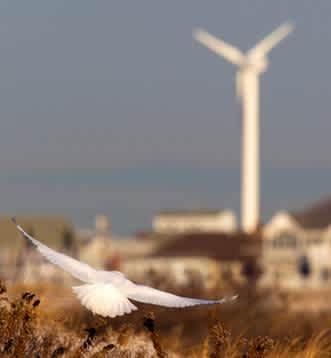Federal Agencies Sued Over Failure to Disclose Correspondence with Wind Industry
OutdoorHub 06.26.12

In a lawsuit filed today in Washington D.C. District Court, American Bird Conservancy (ABC) has accused the federal government of suppressing information about wind energy projects and their potential negative impact on America’s wildlife. ABC is being represented in the suit by the Washington D.C. public-interest law firm of Meyer Glitzenstein & Crystal.
ABC charges that two Interior Department (DOI) agencies flagrantly violated the Freedom of Information Act (FOIA) by failing to comply with statutory deadlines for disclosure of information, and by failing to provide their correspondence with wind developers and other information related to potential impacts on birds and bats, and bird and bat deaths at controversial wind developments in 10 states.
“It’s ridiculous that Americans have to sue in order to find out what their government is saying to wind companies about our wildlife—a public trust,” said Kelly Fuller, Wind Campaign Coordinator for ABC. “ABC is concerned that many of these projects have the potential to take a devastating toll on songbirds, majestic eagles, and threatened and endangered species,” she added.
ABC filed six requests under FOIA – all of them more than eight months ago. ABC’s FOIA requests asked for the U.S. Fish and Wildlife Service’s correspondence with wind developers regarding birds and bats, as well as related information about wildlife impacts, such as studies showing which bird and bat species were in the area and how many had been killed by the facilities. ABC’s FOIA requests were to be processed by the U.S. Fish and Wildlife Service (FWS), which subsequently referred one request to the Bureau of Indian Affairs (BIA). Under FOIA’s strict deadlines, the agencies were required to fulfill the requests or claim exemptions within 20 working days.
“In President Obama’s first month in office, he directed federal agencies to respond to the public’s FOIA requests promptly and in a spirit of cooperation. The President said, ‘A democracy requires accountability, and accountability requires transparency.’ With this lawsuit, ABC is asking the Department of the Interior to carry out the President’s promise,” said Fuller. “Some DOI offices have not sent a single document that we asked for, even though the agencies were legally required to do so more than seven months ago.”
Many organizations are concerned about the U.S. government’s management of wind energy’s impacts on wildlife. In May 2012, ABC and 60 other organizations asked committees in the U.S. House and Senate for Congressional oversight of FWS’s implementation of new voluntary guidelines for avoiding, minimizing, and mitigating the impacts of wind energy on wildlife. Ninety-one organizations endorsed an extensive rulemaking petition submitted by ABC requesting that FWS establish mandatory wildlife protection regulations in lieu of the voluntary approach favored by the industry.
In a March 2012 letter rejecting ABC’s petition, FWS Director Daniel Ashe asserted that FWS was being “meticulously transparent” in how the Service was addressing the impact of wind power on wildlife, and asked for ABC’s help in assessing the effectiveness of the voluntary wind guidelines. “But stonewalling FOIA requests is hardly ‘transparency,’ and without timely access to the crucial information held by the Service, evaluating the effectiveness of the guidelines will be impossible. ABC also will not be able to properly fulfill our mission to protect native birds and their habitats throughout the Americas,” said Fuller.
ABC’s FOIA requests were in regard to proposed and existing wind energy developments in Arizona, California, Florida, Minnesota, Nebraska, Nevada, New Mexico, North Dakota, South Dakota, and Texas. Birds that could potentially be harmed include Bald and Golden Eagles, as well as birds that have been federally designated as threatened and endangered, such as Whooping Cranes, Northern Aplomado Falcons, Least Terns, Piping Plovers, Marbled Murrelets, Snail Kites, Wood Storks, and Northern Crested Caracaras. Other birds that could potentially be harmed include night-migrating songbirds, birds of prey, and candidates for listing under the Endangered Species Act such as Greater Sage-Grouse and Sprague’s Pipit.
ABC supports Bird-Smart Wind Power, which employs careful siting, operation and construction mitigation, bird monitoring, and compensatory mitigation to reduce and redress any unavoidable bird mortality and habitat loss. In May 2012, ABC released an interactive web map to help wind energy development become more Bird-Smart. The map shows more than 2,000 locations in the United States where birds will be particularly vulnerable to the impacts of wind energy development.

